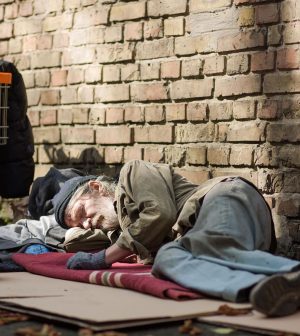- Could Your Grocery Store Meat Be Causing Recurring UTIs?
- Are You Making This Expensive Thermostat Error This Winter?
- Recognizing the Signs of Hypothyroidism
- 10 Strategies to Overcome Insomnia
- Could Artificial Sweeteners Be Aging the Brain Faster?
- Techniques for Soothing Your Nervous System
- Does the Water in Your House Smell Funny? Here’s Why
- Can a Daily Dose of Apple Cider Vinegar Actually Aid Weight Loss?
- 6 Health Beverages That Can Actually Spike Your Blood Sugar
- Treatment Options for Social Anxiety Disorder
Homeless Americans Face 16 Times the Odds for Sudden Death

Life on the streets can be deadly, with homeless Americans 16 times more likely to die suddenly than their peers, a new study says.
“Homeless individuals die young, at a mean age of 50 years,” said study co-author Dr. Zian Tseng, a cardiologist and professor of medicine at the University of California, San Francisco (UCSF).
“Our study sheds light into the contribution of sudden death to the homeless population. We found both cardiac and non-cardiac causes, such as overdoses and unrecognized infections, are much higher among homeless individuals dying suddenly,” Tseng said in a UCSF news release.
His team found that those experiencing homelessness had a 16-fold higher rate of sudden death from heart attacks and other causes. After excluding deaths from noncardiac causes, such as drug overdose, the rate of sudden cardiac death was still seven times higher than in the general population.
Some of those deaths might have been prevented with access to defibrillators and other public policy measures, according to the study authors.
For the study, the researchers looked at autopsies of nearly 870 people who had died suddenly, more than 150 of whom were homeless.
Among the homeless, the investigators found a higher prevalence of alcohol and substance use, and psychiatric conditions, especially schizophrenia and bipolar disorder.
Homeless people died most often from noncardiac causes, while housed individuals died more frequently from heart-related causes. These noncardiac causes included drug overdoses, gastrointestinal disorders and infection.
Paramedic response times were similar between both groups, the study found.
“While the high rate of substance use in the homeless population has long been recognized, our study demonstrates its association with early, sudden mortality and its true impact among the homeless,” said co-author Dr. Leila Haghighat, a cardiology fellow at UCSF.
“Public health interventions such as increasing the availability of automatic external defibrillators and redoubled efforts to treat substance use and targeted immunization efforts might be helpful to reduce sudden mortality,” she said.
The findings were published Oct. 23 in JAMA Internal Medicine.
More information
The National Health Care for the Homeless Council has more on homelessness and death.
SOURCE: University of California, San Francisco, news release, Oct. 23, 2023
Source: HealthDay
Copyright © 2026 HealthDay. All rights reserved.










